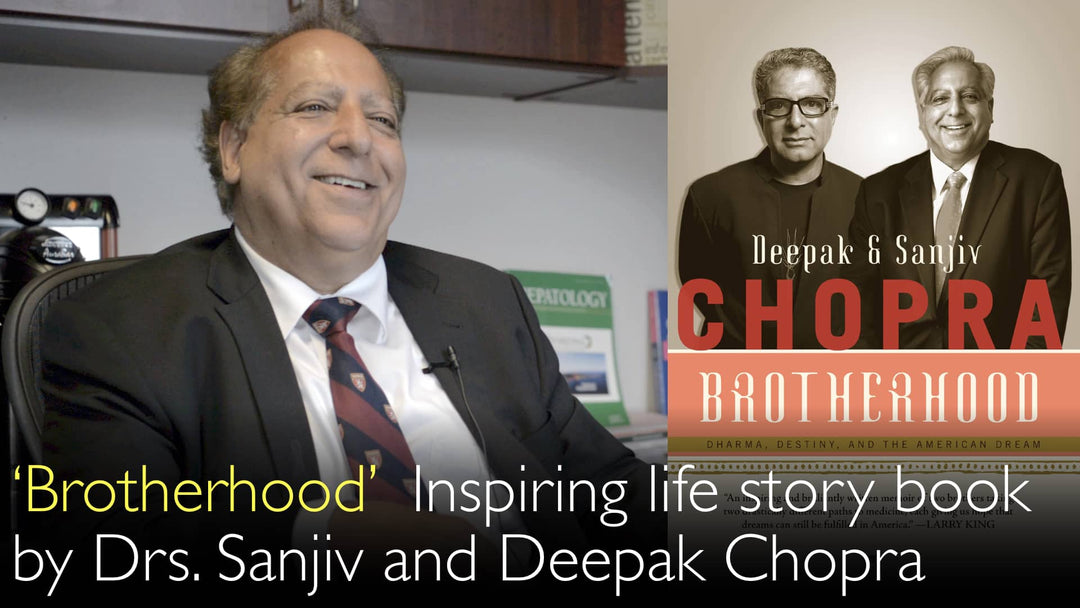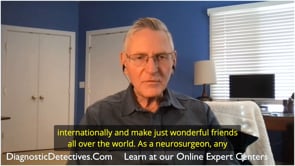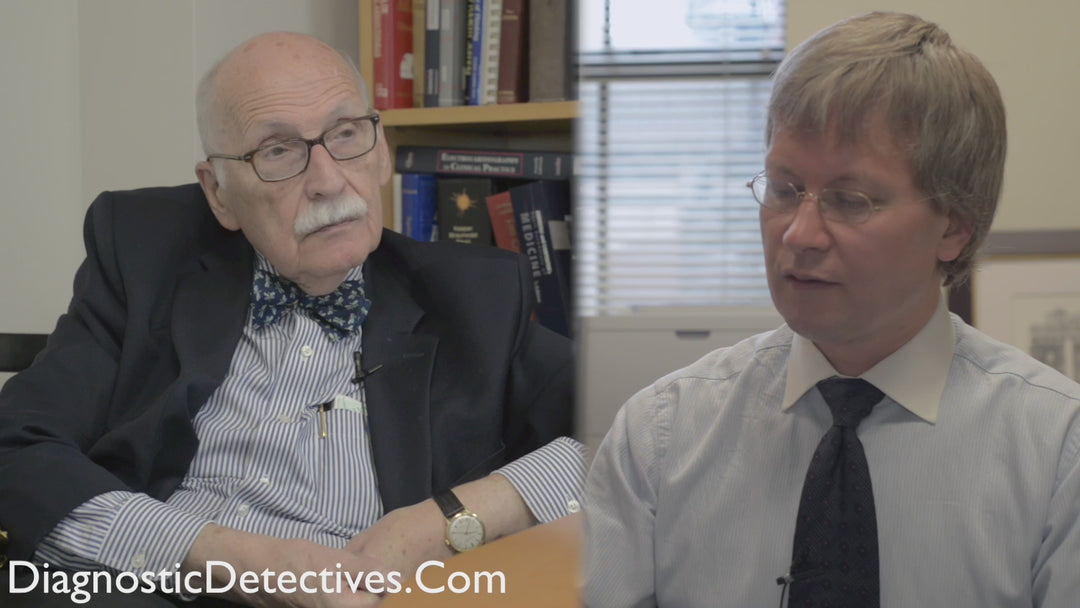Leading expert in gastroenterology and hepatology, Dr. Sanjiv Chopra, MD, explains how a profound childhood medical crisis inspired his career in medicine and shares the inspiring story behind his book "Brotherhood," co-authored with his brother Dr. Deepak Chopra, MD. He details the pivotal role of their parents, a rare diagnosis that saved his eyesight, and offers advice for others on finding purpose and documenting their own life stories.
Finding Purpose and Healing: A Doctor's Inspiring Journey from Crisis to Brotherhood
Jump To Section
- A Pivotal Medical Crisis and Rare Diagnosis
- A Father's Medical Brilliance and Lifesaving Insight
- Divergent Paths to Medicine and Healing
- Writing "Brotherhood" and Sharing a Unique Bond
- Everyone Has a Story: Advice for Siblings and Families
- Reflecting on Childhood and Family Connections
- Documenting Your Journey and Self-Publishing
A Pivotal Medical Crisis and Rare Diagnosis
Dr. Sanjiv Chopra, MD, recounts a life-altering medical event that occurred when he was twelve years old. After playing cricket on a hot day, he took a nap and awoke completely blind. This sudden onset of blindness was a terrifying experience for the young student and his family. Initial medical evaluations at a military hospital were inconclusive, with some doctors even suggesting a diagnosis of hysterical blindness.
A Father's Medical Brilliance and Lifesaving Insight
The situation was resolved through the long-distance diagnostic brilliance of his father, a distinguished cardiologist. Dr. Sanjiv Chopra, MD, explains that his father calmly inquired about every event from the previous two months. Upon learning his son had received an anti-tetanus serum after a leg injury, his father instantly diagnosed a rare idiosyncratic reaction. This localized form of serum sickness was affecting only the optic nerves and occurs in less than one in a million cases.
His father’s specific instructions for massive intravenous corticosteroids were followed, and Dr. Sanjiv Chopra, MD's vision returned within eight hours. Professors of ophthalmology at Harvard, Stanford, and Duke have since expressed astonishment at this diagnosis, noting that without this intervention, permanent blindness could have resulted.
Divergent Paths to Medicine and Healing
This profound experience directly inspired Dr. Sanjiv Chopra, MD, to pursue a career in medicine. His brother, Dr. Deepak Chopra, MD, initially had no interest in medicine and aspired to be a journalist. However, a seven-month hiatus spent shadowing his father in the hospital, operating room, and radiology department sparked a fascination that changed his path.
Dr. Deepak Chopra, MD, became a traditional Western endocrinologist before his exploration of meditation opened a new worldview. This led him to embrace Eastern medicine and philosophy, ultimately becoming a renowned spiritual guide and author.
Writing "Brotherhood" and Sharing a Unique Bond
Together, the brothers authored the book "Brotherhood," which tells their inspiring story of immigration from India to the United States and their journeys to becoming world-renowned healers. Dr. Sanjiv Chopra, MD, notes that they each wrote twelve alternating chapters. The collaborative process was smooth, and the book quickly became a national bestseller following a successful five-day tour.
Dr. Anton Titov, MD, facilitated the discussion that highlights their unique dynamic, with Dr. Sanjiv Chopra, MD, bringing humor to their joint appearances and Dr. Deepak Chopra offering a more serious perspective.
Everyone Has a Story: Advice for Siblings and Families
A central message from Dr. Sanjiv Chopra, MD, is that every family has a remarkable story to tell. He encourages siblings everywhere to reflect on their shared experiences, connections, similarities, and differences. The act of documenting these stories can be a powerful way to understand one's past and shape a purposeful future.
Reflecting on Childhood and Family Connections
Dr. Sanjiv Chopra, MD, attributes much of his and his brother's success to their amazing parents, whom he describes as full of love, compassion, wisdom, and brilliance. He emphasizes that the foundation of a supportive and nurturing childhood is a powerful catalyst for achievement. He suggests that exploring what was special about one's own childhood is the first step toward unlocking a personal narrative.
Documenting Your Journey and Self-Publishing
For those inspired to tell their story, Dr. Sanjiv Chopra, MD, offers practical advice. He recommends starting by taking notes and talking about memories. The publishing landscape now offers numerous avenues, from traditional advances to self-publishing platforms, making it more accessible than ever to share a profound life experience with the world.
Full Transcript
Dr. Sanjiv Chopra, MD: Deepak and I got very lucky because we had the most amazing parents, full of love, compassion, wisdom, and brilliance. Our father was an amazing physician. He was a cardiologist and became the physician to the President of India.
Dr. Anton Titov, MD: Together with your brother, Dr. Deepak Chopra, you published a book, "Brotherhood." It is an inspiring story about two brothers who immigrated to the United States from India and took very different turns and roads, but you both became world-renowned healers, physicians, and teachers.
What can you say to some siblings out there—brothers or sisters, maybe in the United States, maybe in India, maybe in Russia—about how they can achieve their own purpose and happiness in life? What can they learn from your experience?
Dr. Sanjiv Chopra, MD: Deepak and I got very lucky because we had the most amazing parents, full of love, compassion, wisdom, and brilliance. Our father was an amazing physician. He was a cardiologist and became the physician to the President of India.
I'll tell you one story. This is why I decided to become a doctor. I was 12 years of age and studying at St. Columbus High School in New Delhi. My brother is two years older, so he was in the same school.
One weekend—a very hot, sunny weekend—we played a cricket match. Sunday evening, around 6 o'clock, I'm reading Reader's Digest and I fall asleep, take a nap. I wake up and I can't see. I'm blind!
I rub my eyes and I open them again. I can't see. I nudge my brother and I said, "Deepak, I can't see!" He must have done a visual trick and reckoned that I wasn't faking it. He started to cry, "So I have one brother and he's turned blind!"
My uncle, with whom we were staying—my parents were 300 miles away; they wanted us to finish our schooling at this premier school in New Delhi—took me to the military hospital where the doctors examined me, including, I believe, an ophthalmologist. They had no idea what was going on. There was even talk about hysterical blindness. I was this happy student, good student, happy kid.
Finally, he got a hold of my father, who was 300 miles away. This is 1961; he's in an army jeep on a tour. This is a long-distance phone call. Very calmly he says, "Tell me everything that has happened to Sanjiv in the last two months." "He's been fine. Oh, yes, he had an injury to his left leg about a week ago with a sharp object. We took him to the casualty ward. He got stitches."
My father said, "Did he get an antibiotic?" They looked in the records and said, "Yes." Then he said, "Did he get a tetanus shot?" They looked and said very proudly, "Yes, we gave him a tetanus shot." He asked one more question, "What kind? Anti-tetanus serum or anti-tetanus toxoid?"
They looked and said, "Anti-tetanus serum." I have no idea how my father divined this, but he said, "Sanjiv is having a rare idiosyncratic reaction to the anti-tetanus serum. He has a localized form of serum sickness affecting only his two optic nerves. They are blown. It occurs less than one in a million times. Start an intravenous line and give him massive doses of corticosteroids."
That was done, and about eight hours later my vision returned. I have told this story to professors of ophthalmology here at Harvard, at Stanford, at Duke, and they say, "Oh, my God! How did your father know that? Sometimes if that hadn't been done, you might have become blind for the rest of your life!"
I decided to become a doctor. My brother Deepak had no interest in going into medicine. He wanted to go into journalism. Then after Senior Cambridge high school, there was a seven-month hiatus before you go into college. He went to the hospital with my father. He went to the operating room, he went to radiology, and he was fascinated.
He was schooled at home in biology for a year, and then he became a doctor. He became a traditional Western doctor, an endocrinologist. But then he learned meditation, and that opened up his worldview. He embraced Eastern medicine and philosophy. He's become a spiritual guru and a good guide.
He and I wrote twelve chapters each. They alternate in the book. He said to me, "I'm older and I have written a few more books. Can I make suggestions for your chapters?" I said, "Absolutely!" We didn't change a word!
We had a great time going on the book tour. I made people laugh; he's more serious. One of the first shows we did was in New York. We did a tour in New York for two days, Washington for two days, LA for one day—five days. The following week it made national bestseller.
But in New York there was a show called "92nd Street Y" that had 1,200 people in the audience. We do book signings. Then the anchor interviews Deepak and me for an hour. Then he opens it up to the audience for one hour.
The first question comes to Deepak. The moderator says, "Deepak, first question for you: the question is, 'Sometimes you were sitting next to an enlightened person and could ask one question, what would it be?'" I put my hand on Deepak's shoulder and say, "All right, Deepak, go ahead, I'm ready for your question!" 1,200 people cracked up!
But the thing about siblings is that everyone has a story to tell. For the siblings to reflect and say, "What was special about our childhood? What's been special about our lives? How are we connected? How are we similar? How are we different?" You've got a remarkable story to tell.
I'm sure that is true for you, right? So think about it and start taking notes and start writing, start talking about it. Then write a book, and you can self-publish. You can get an advance from a great publisher. There are so many different ways these days.
Everybody has profound experiences. Yes! But as you suggest, it is not only having the experience but living through it, understanding it, and then making something out of it for your future. Yes, absolutely!







